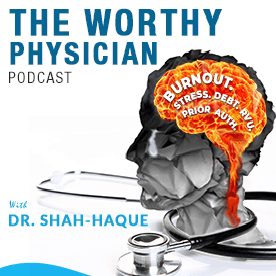Navigating Career Transitions in Medicine: Dr. David Weill’s Story
When we think about a physician’s career path, it’s easy to envision a well-defined, linear journey: medical school, residency, fellowship, and decades of dedicated clinical practice until retirement. This traditional trajectory, however, doesn’t account for the emotional and physical toll that certain specialties can exact over time. What happens when a doctor recognizes that the very career they’ve built with passion and precision has a 'shelf life'?
In the most recent episode of The Worthy Physician, Dr. David Weill, MD, a former transplant pulmonologist at Stanford, shared his remarkable journey from the heights of clinical medicine to a fulfilling second act in consulting and writing. His story offers invaluable insights for physicians grappling with similar crossroads.
The Height of a Distinguished Career
For over 20 years, Dr. Weill dedicated himself to transplant medicine, directing a transplant team, managing patients on waiting lists, and collaborating with surgeons to offer patients new lungs and new opportunities at life. Achieving the pinnacle of his specialty, he built systems, led teams, and made a lasting impact.
Yet, despite his considerable success, Dr. Weill deliberately decided to step away from transplant medicine at the age of 52. Yes, he stepped into his second act! It was not a choice made in haste or frustration, but a thoughtful, years-long consideration rooted in self-awareness and practicality. The physical and emotional demands of transplant medicine—its unpredictable hours, deep patient connections, and relentless intensity—eventually took a toll that Dr. Weill could no longer justify.
A Methodical Approach to Transition
Dr. Weill’s transition from full-time clinical work to consulting and writing was as thoughtful and precise as his clinical practice. Rather than abruptly abandoning medicine, he undertook a structured process of self-reflection. He took out a legal pad and began analyzing his career from a strengths-based perspective, identifying the aspects of his work he excelled at and enjoyed most.
What emerged was a clarity that many physicians struggle to find: Dr. Weill discovered that his greatest fulfillment came from patient care, building systems, and improving transplant programs. This insight led him to pursue consulting work, where he could leverage his expertise to benefit multiple hospitals, amplifying his impact far beyond the reach of individual patient care.
The Emotional Weight of Medicine
The conversation unveiled a profound truth often overlooked in medical circles: the emotional weight of forming meaningful connections with patients in high-stakes specialties like transplant medicine. Dr. Weill spoke candidly about the emotional burden of losing patients with whom he had formed close relationships.
While many physicians are conditioned to 'power through' such losses as part of the job, Dr. Weill recognized that these emotional wounds had accumulated over time, making the long-term sustainability of his career increasingly untenable. His honest admission that he viewed aspects of his career as 'failure' when transplants didn’t succeed sheds light on the perfectionism that often drives physicians but can also be their most excellent source of moral injury. It also shows physicians' deep connection and empathy for their patients.
Writing as a New Avenue of Fulfillment
One of the most inspiring aspects of Dr. Weill’s story is his successful pivot to writing. He has authored two books—a memoir titled Exhale, which chronicles his experiences in transplant medicine, and a novel called All That Really Matters, which explores similar themes through the lens of fiction.
Transitioning from academic medical writing to storytelling required a significant shift for Dr. Weill. He described the discipline of writing as a demanding endeavor, one that requires an obsessive dedication to the topic. Quieting the 'noisy brain' developed over decades of clinical work and adapting to a more creative, less structured writing style was both challenging and rewarding.
Practical Advice for Physicians Considering Change
Dr. Weill offers practical, applicable advice for physicians contemplating their career transitions: test-drive your next chapter while still in your current role. During his final year at Stanford, he began consulting with other hospitals and working on his memoir. This gradual shift allowed him to confirm his passion and aptitude for his new pursuits before fully committing. It also provided a sense of security and confidence during what might otherwise have been an overwhelming leap.
The "Three Fs" for Sustaining High-Pressure Careers
Dr. Weill concludes with the 'three Fs' essential for thriving in demanding careers: family, friends, and faith. Importantly, by faith, he refers to organized religion and whatever spiritual practice offers grounding and peace—meditation, yoga, writing, or simply spending time by the ocean. His message is simple yet powerful: maintaining meaningful connections and finding spiritual grounding are critical to professional sustainability, regardless of specialty.
Dr. Weill’s journey is a testament to personal resilience and reinvention and a broader call to action for the medical community. Physicians are often so dedicated to their patients and their craft that they neglect their well-being. Dr. Weill’s story reminds us that it’s possible to pivot with intention, maintaining one’s identity as a healer while exploring new avenues of fulfillment.
His message is clear: A physician’s career does not have to be a straight line. The courage to adapt, to acknowledge when the demands of a specialty have become unsustainable, and to find new ways to contribute can be a powerful act of self-preservation and growth.


